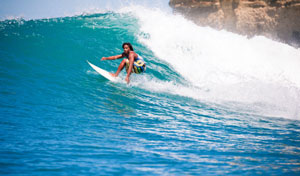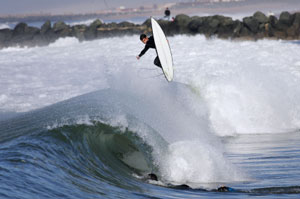Surfing FAQ
Before you pick up a surfboard, before you learn to paddle, before you even set foot on the sand, there is an entire body of knowledge and skill that can help you successfully learn to surf.

As any surfer can tell you, the more comfortable you are in the water, the better. The best way to get comfortable is to understand the most rudimentary points of learning to surf. Many of these details are covered in the iSport surfing guide, “Learning to Surf” (link to the right). However, there are some points that precede even the basic principles outlined by that guide. Below, we’ll discuss some of the frequently-voiced concerns from newcomers to the sport.
Do I Need to Be a Good Swimmer?
No, but it certainly helps. Even if you aren’t a highly-skilled swimmer, you can still be a totally competent surfer. Of course, if you can’t swim at all, do not even think about entering the ocean. Enroll in swim lessons and spend time in the swimming pool before you take on the dynamic, and dangerous, ocean arena. If you’re in the poor-to-fair range as a swimmer, it’s advised to brush up on your skills before you try surfing.
Remember, you will have the buoyancy of the surfboard under you most of the time, but you don’t want to be dependent on the board to stay afloat. There will be times when you come detached from your board, so if a dire situation arises, you need to be able to safely swim to the beach.
Am I Too Old to Start Surfing?
As with any sport, the younger you start surfing, the easier it is to learn. Visit any beach community and you’ll see plenty of kids under the age of 14 with near-breathtaking skills. But even a middle-aged beachgoer can learn how to surf with competence, and it’s not unheard of for some people to successfully learn even later than that.
With that said, if you’re well past your prime in terms of physical coordination and strength, learning to surf will likely be a challenge. You’re going to be competing for waves with people who have much more experience than you, and you’re going to have to deal with being a new face in the crowd. You’ll also tire faster, and you may lack some of the agility of younger surfers. But you can absolutely learn to surf at any age — just have patience, use a board that will maximize your ability, and stay positive.
Should I Start on a Longboard or a Shortboard?
Longboarding and shortboarding represent opposite ends of the surfing spectrum, both athletically and culturally. Longboarders tend to be a more relaxed group, surfing with “flow” on a variety of wave sizes and types. Shortboarding takes a more aggressive approach to wave-riding, and requires a more specific wave type (fast and powerful) to reach full potential.

For beginners, it really doesn’t make much difference what you choose, because you’re going to be going through the basic steps of learning whether your ultimate goal is to become a longboarder or shortboarder.
Check out iSport’s surfing guide, “Choosing the Right Surfboard” (link to the right), to get a more comprehensive rundown of what to look for in a beginner-friendly surfboard. Basically, you want your board to be 7 to 9 feet long and around three inches thick.
Do I Need Wetsuit?
Whether you need a wetsuit depends entirely on where you want to surf. If you’re living in a cool or cold-water climate (where temperatures fall below 70 degrees Fahrenheit), then you will absolutely need a wetsuit. If you’re surfing in a tropical climate where water temperature hovers at or above 70 degrees Fahrenheit, then a wetsuit will probably not be necessary. Check out the iSport guide, “Choosing and Caring for Your Wetsuit” (link to the right) for more details.
Where Should I Learn to Surf?
For a more detailed breakdown of the various types of surf locations, read the iSport guide, “How to Choose the Right Surf Spot” (link to the right). Basically, you want to meet two criteria: lack of crowds and beginner-friendly waves. The first one is easy enough, but what about beginner-friendly waves? Look for soft shoulders, and waves that are waist-high and below.
Don’t Worry, Be Happy
Before you mull over the infinite list of factors that may or may not impact your abilities on a surfboard, consider the most basic question: will I have fun learning to surf? Does flailing around in the ocean, playing in waves, and eventually riding them seem like a well-spent afternoon? Will you have a blast even if you aren’t tearing up the waves like Kelly Slater? At the end of the day, your initial surfing experiences should be about having fun participating in the overall experience of wave riding, not whether you can execute technical maneuvers or win contests. If you think surfing looks fun, give it a shot. You won’t know what it’s like until you try.
